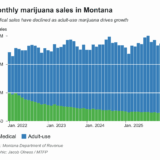A decade into legalization, cannabis companies are still locked out of tax deductions for giving back – but that hasn’t stopped them from making a difference.
By Jon Marshall
Businesses give back for a variety of reasons. Whether it is to help meet critical local needs, build deeper relationships with customers or raise brand awareness, supporting the community is often both a moral and strategic business choice. In most cases, businesses are rewarded for their generosity through tax deductions on charitable donations. But many people are surprised to learn that this is not an option for businesses in the cannabis industry.
Despite cannabis being legal for adult use in Nevada for nearly a decade, the industry’s businesses are still subject to outdated federal laws that block them from receiving the same financial tax benefits available to other industries. Few Nevadans realize that when their favorite dispensary donates to a local food bank or sponsors a community event, they are doing so without any tax relief. And yet, many cannabis companies across the state continue to step up in order to give back to the communities they call home.
The Roadblocks to Giving
The biggest barrier for cannabis businesses is a section of the federal tax code known as 280E. Originally designed to prevent illegal drug traffickers from claiming business expenses, 280E now applies to all state-legal cannabis companies because cannabis remains a federally controlled substance. That means everything from charitable donations to marketing costs and even employee benefits is not considered a deductible business expense like they are for other companies.
On top of the taxation challenges, cannabis businesses struggle with limited access to banking, tight restrictions on advertising and promotions, and a rapidly changing patchwork of state regulations. When you look at these barriers, it becomes easy to see why giving back can be more complicated – and costly – for a cannabis company than for nearly any other business in Nevada.
Still Giving, Still Local
So why do they do it? For many cannabis operators, it comes down to values – and roots. Nevada’s cannabis industry is filled with local entrepreneurs who live and work in the communities they serve. They employ locals, support neighborhood nonprofits, and often lead efforts in food drives, holiday gift programs, and harm-reduction events. The industry is deeply aware of its connection to the broader movement for social equity and restorative justice. That legacy of activism and accountability is baked into many cannabis brands’ missions.
And of course, giving back is also good business. In a competitive and heavily regulated market, reputation matters. Companies know that building trust through visible, authentic community support fosters long-term loyalty. Whether it is partnering with organizations that support veterans or helping provide school supplies to underserved kids, these efforts make a lasting impact regardless of what the IRS allows on a balance sheet.
Many operators like Deep Roots Harvest and The Source integrate volunteering and community partnerships into their company culture. For example, for the past several years, both companies have held holiday food drives across the state and provided financial support to multiple Veterans organizations throughout Nevada. These programs offer opportunities for both employees and customers to get involved and often serve critical needs in the communities they serve.
Leading with Generosity
Despite the unique restrictions placed on them, cannabis companies in Nevada are proving that generosity is not about tax breaks – it is about doing what is right. And as the industry continues to grow, its commitment to the community remains strong. The hope is that one day, federal policy will catch up with the state’s values. Until then, Nevada’s cannabis businesses are finding creative, heartfelt ways to uplift the people and places we are proud to serve.
Jon Marshall is Chief Operating Officer of Nevada cannabis operators Deep Roots Harvest and The Source.
This article is from an external, unpaid contributor. It does not represent High Times’ reporting and has not been edited for content or accuracy.





























